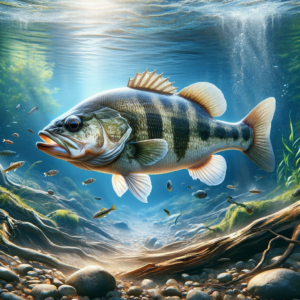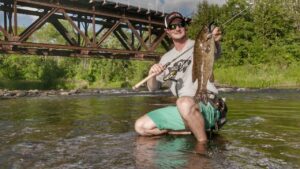Have you ever considered adding smallmouth bass to your pond? It can be an enticing idea, but before you make a decision, it’s important to weigh the pros and cons. Smallmouth bass are a popular sportfish known for their strength and fighting ability, but there are factors to consider that could impact the overall health and balance of your pond ecosystem. In this article, we will explore the pros and cons of introducing smallmouth bass to your pond, providing you with the necessary information to make an informed decision.
When it comes to the pros, smallmouth bass can provide recreational opportunities for fishing enthusiasts. They are highly prized for their aggressive behavior and the challenge they offer anglers. Introducing smallmouth bass to your pond can create a new and exciting fishing experience, adding value to your property and potentially attracting more visitors. Additionally, smallmouth bass can help control certain species of prey fish, contributing to a more balanced ecosystem.
However, it’s important to consider the potential downsides as well. Smallmouth bass are known to be voracious predators and their introduction can disrupt the existing balance of your pond. They may prey on other fish species, including desirable ones, potentially leading to a decline in biodiversity. Introducing smallmouth bass could also result in increased competition for resources, such as food and habitat, which may negatively impact the overall health of your pond.
In conclusion, the decision to introduce smallmouth bass to your pond should not be taken lightly. While they offer recreational opportunities and can contribute to controlling certain prey fish, there are potential drawbacks to consider. It’s crucial to assess the unique characteristics and needs of your pond before making a decision. By weighing the pros and cons, you can ensure that the introduction of smallmouth bass aligns with your goals and the overall health of your pond ecosystem.
The Pros and Cons of Introducing Smallmouth Bass to Your Pond
Deciding whether to introduce a new fish species to your pond is an important decision that requires careful consideration. Smallmouth bass, known for their aggressive nature and thrilling sport fishing opportunities, can be an enticing addition to ponds. However, like any invasive species, they can also have significant impacts on the local ecosystem. In this article, we will discuss the benefits and potential drawbacks of introducing smallmouth bass to your pond, as well as strategies to minimize negative impacts and maximize the potential benefits.
Enhanced Fish Population Growth
One of the major benefits of introducing smallmouth bass is the potential for enhanced fish population growth. Smallmouth bass are voracious predators and can help control populations of small, nuisance fish species. By preying on these smaller species, the bass can create more resources and space for other fish to thrive. This can lead to a more diverse and balanced fish population in your pond.
Improved Ecological Balance
Smallmouth bass can also contribute to improved ecological balance in your pond. As predators, they help control the population of smaller fish and maintain a healthy balance in the ecosystem. This can prevent overpopulation of certain species and promote overall stability within the pond’s food web. A well-balanced ecosystem is essential for the long-term health and sustainability of any aquatic environment.
Increased Angling Opportunities
For many pond owners, the main motivation for introducing smallmouth bass is the increased angling opportunities they provide. Smallmouth bass are known for their aggressive fight and are popular targets for sport fishing enthusiasts. Having these game fish in your pond can create a thrilling angling experience and attract more anglers to your property. This can lead to increased tourism and revenue for surrounding businesses.
However, before making the decision to introduce smallmouth bass, it is important to consider the potential drawbacks and environmental impacts associated with this species.
Predation on Native Fish Species
One of the major concerns with introducing smallmouth bass is the potential predation on native fish species. Smallmouth bass are aggressive predators and can outcompete and prey upon certain native fish. This can lead to a decline in the population of these native species and disrupt the natural balance of the ecosystem. It is important to carefully assess the existing fish community in your pond and evaluate the potential risks before introducing a new predator like smallmouth bass.
Altered Aquatic Food Chains
Introducing smallmouth bass to a pond can also have cascading effects on the aquatic food chains. They often feed on small forage fish, which can impact the abundance and diversity of these species. This can subsequently affect the availability of food for other predators, such as larger fish, birds, and mammals. Altering the natural food chains can have far-reaching consequences for the entire ecosystem, and it is essential to consider these potential impacts before making a decision.
Negative Impact on Aquatic Vegetation
Another concern with smallmouth bass introduction is their potential negative impact on aquatic vegetation. Smallmouth bass often prefer open water habitats and tend to avoid areas with dense vegetation. This can lead to a decrease in the abundance and diversity of aquatic plants, which play a crucial role in maintaining water quality, providing cover for small fish, and supporting invertebrate communities. A decline in aquatic vegetation can have broader implications for the overall health and stability of the pond ecosystem.
Effect on Water Quality
The introduction of smallmouth bass can also have an effect on water quality in your pond. They influence nutrient cycling by consuming smaller fish, which can impact the nutrient availability in the system. This can result in either increased or decreased nutrient levels, depending on the specific conditions. Additionally, the increased activity and feeding of smallmouth bass can disturb the sediment and potentially reduce clarity and overall water quality. It is important to assess the existing water quality conditions in your pond and consider the potential impacts before introducing this species.
Managing Bass Population
To minimize the potential negative impacts of introducing smallmouth bass to your pond, it is crucial to implement effective management strategies. Regular monitoring and assessment of the fish population can provide valuable information about the health and balance of the ecosystem. This includes monitoring the abundance of smallmouth bass and their impact on native fish species.
Implementing catch-and-release policies can also help maintain a stable bass population and reduce the potential for overfishing. By encouraging anglers to release their catch, you can ensure the sustainability and long-term success of the smallmouth bass population in your pond.
Ecological Considerations
When introducing any new species to an ecosystem, it is important to consider the potential disruptions to native ecosystems. Smallmouth bass have the potential to disrupt the natural balance of the pond ecosystem, particularly in terms of invertebrate communities. Invertebrates play a crucial role in nutrient cycling, decomposition, and overall ecosystem health. The introduction of smallmouth bass can potentially impact these communities and have far-reaching consequences for the entire ecosystem.
Furthermore, smallmouth bass can also have an impact on amphibians and aquatic reptiles. Being predators, they may compete with or prey upon these organisms, potentially leading to a decline in their populations. It is essential to consider the potential impacts on these species and evaluate the overall ecological balance before introducing smallmouth bass to your pond.
Angling and Recreational Benefits
Despite the potential drawbacks, introducing smallmouth bass to your pond can offer various angling and recreational benefits. Smallmouth bass are renowned for their thrilling sport fishing opportunities and can provide an exciting challenge for anglers. By creating an enjoyable angling experience, you can attract more visitors and potentially generate increased tourism and revenue for your pond.
Strategies to Minimize Negative Impacts
To minimize the potential negative impacts associated with the introduction of smallmouth bass, several strategies can be employed. Educating anglers about the potential ecological impacts and the importance of responsible fishing practices is crucial. Implementing size and bag limits can help maintain a balanced bass population and reduce the potential for overfishing.
By encouraging responsible fishing practices and creating awareness among anglers, you can help minimize the negative impacts and promote the sustainability of the smallmouth bass population in your pond.
Economic Considerations
When considering introducing smallmouth bass to your pond, it is important to take into account the costs and potential financial benefits. The cost of introducing smallmouth bass can vary depending on various factors, including the source of the fish, transportation, and any necessary permits. It is essential to carefully evaluate the financial implications and assess the potential return on investment.
Additionally, the increased tourism and revenue generated by the presence of smallmouth bass can be a significant consideration. By attracting anglers and visitors to your property, you can potentially generate additional income and benefits for the local economy.
Role of Smallmouth Bass in Aquaculture
Beyond recreational purposes, smallmouth bass also have potential applications in aquaculture. They can be commercially produced for food and provide a valuable source of income for aquaculture operations. Aquaponics, a system that combines aquaculture and hydroponics, can also benefit from the addition of smallmouth bass. The waste produced by the fish can serve as a nutrient source for plant cultivation, creating a sustainable and efficient system.
Hybridization is another aspect of the role of smallmouth bass in aquaculture. Hybrid bass, a crossbreed between smallmouth bass and striped bass, exhibit desirable traits such as rapid growth and resilience. This hybridization can provide opportunities for improved aquaculture production and profitability.
Conclusion
Deciding whether to introduce smallmouth bass to your pond requires weighing the pros and cons carefully. While smallmouth bass can enhance fish population growth, improve ecological balance, and provide thrilling angling opportunities, their introduction can also have negative impacts on native fish species, alter aquatic food chains, and impact water quality and vegetation.
By implementing effective management strategies, educating anglers, and considering the potential ecological and economic implications, you can make informed decisions that maximize the benefits and minimize the potential drawbacks of introducing smallmouth bass to your pond. It is essential to prioritize the long-term health and sustainability of your pond ecosystem while also considering the potential recreational and economic benefits that smallmouth bass can offer.




